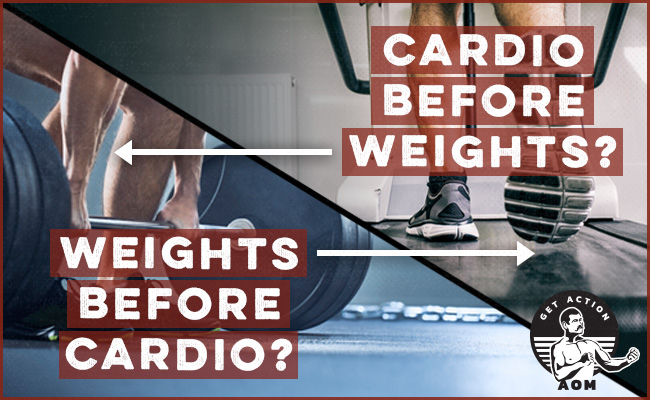With our archives now 3,500+ articles deep, we’ve decided to republish a classic piece each Friday to help our newer readers discover some of the best, evergreen gems from the past. This article was originally published in February 2019.
You’re a busy man. So when you work out, you aim to get in both strength training and cardio exercise in a single session.
But should you do weights or cardio first?
To help me answer that question, I talked to my barbell coach, Matt Reynolds, owner of Barbell Logic Online Coaching.
His answer? For most people, it’s best to lift weights before doing cardio.
For why, read on.
Why You Should Lift Weights Before Doing Cardio
To get stronger, you want to lift the most weight possible during a workout. But when you do cardio before you lift weights, you prevent yourself from achieving this goal. As Matt explains, “When you do cardio before strength training, you fatigue the muscle, which causes a decrease in the contractual force your muscles are able to produce, which means you can’t lift as much.”
He continues:
This is because of the ‘all or none principle’ of muscle contraction. Muscle fibers contract at 100%, or they don’t contract at all.
So to lift something 70% of your max would require 70% of your muscle fibers to fire at 100%, rather than 100% of your muscle fibers to fire at 70%.
Because of this, if SOME of your muscle fibers are already fatigued from previous cardio, then less muscle fibers are available to contract for weight training.
Research bears this out. In a study published in the Journal of Strength and Conditioning Research, researchers found that subjects who did a bout of treadmill running before lifting weights had a decrease in muscle power and performed fewer reps compared to when they lifted before running on the treadmill. What’s more, when subjects ran before lifting, lifting just “felt” heavier. The rate of perceived effort increased.
Prioritizing weight training over cardio exercise will not only allow you to lift more lbs, but that advantage leads to another: enhanced fat loss. Matt unpacks how: “Increasing muscle mass increases your resting metabolic rate which allows you to burn more calories when you’re just sitting there existing. And if you want to increase muscle mass, you need to lift heavy weight, and lifting weights before cardio lets you lift heavier weight.”
A final added benefit for lifting weights before cardio is that it can simply save you time in the gym. “Cardio fatigues your muscles so when you finally get to lifting, you may find yourself having to take longer rests between sets to complete your reps, which may lengthen the duration of your workout,” Matt explained.
So if you’re looking to get stronger, lose body fat, and save time in the gym, lift weights before doing cardio.
But isn’t the inverse of this equation also true — that doing strength training before cardio will fatigue your body, diminishing the intensity of your cardio?
Yes, but Matt says it’s important to remember why most people do cardio: “The goal of cardio is to increase aerobic health and improve metabolic pathway conditioning. You can still get your heart pumping and your lungs sucking air even when your muscles are fatigued from weight lifting.”
As he succinctly sums it up: “Weight training doesn’t hurt cardio as much as cardio hurts weight training.”
The Exception to the Rule: If You’re Training for an Endurance Event, Do Cardio First or on Different Days Than You Lift
While Matt recommends most people lift weights before cardio, he does recommend that endurance athletes reverse that order and do cardio before lifting weights. “If you’re training for a 5K, a marathon, a mud run, etc. your primary objective is to increase performance in that event, so you want to go as hard as you can when you train. Lifting weights before endurance training will prevent you from doing that,” he explained.
Matt recommends that endurance athletes do their endurance training and weight training on different days to ensure adequate recovery between training sessions. I’ve known a number of amateur runners who have had great success, both in terms of enhancing performance and preventing injuries, in alternating strength training workouts and running workouts every other day. If that’s not possible due to time constraints, or because your running program requires you to run every day, lift weights AFTER you do your endurance training.



